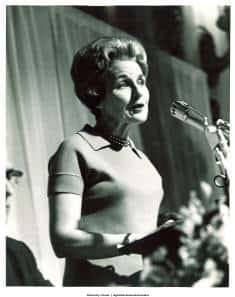Today, at the Iowa Women’s Archives commemorate one of our founders, Mary Louise Smith! Smith was born Mary Louise Epperson on October 6th, 1914 in Eddyville, Iowa. She became involved with the Republican Party in the 1950s and quickly rose through the ranks. In 1974, just after Watergate, she was appointed as the first womanContinue reading “25 for 25: Mary Louise Smith”
Tag Archives: mary louise smith
Election Day! Politics in the Archives
As the site of the Iowa caucuses as well as the home state of countless policy makers and political activists, Iowa is rich with electoral history. As we cast our votes today, we reflect on the decades of campaigning that has brought some of the 20th century’s biggest political names to Iowa, as well asContinue reading “Election Day! Politics in the Archives”
Biographer of Mary Louise Smith to read on November 10th
As part of the celebration of the 20th anniversary of the Iowa Women’s Archives, Suzanne O’Dea will read from her new biography of Archives co-founder Mary Louise Smith and take questions about her research for the book. Join us for coffee and pastries at 10:30 a.m. on Saturday, November 10th, in the North Exhibition HallContinue reading “Biographer of Mary Louise Smith to read on November 10th”
Update from the Iowa Women’s Archives, October 2012
On a sunny day 20 years ago, the Iowa Women’s Archives celebrated its opening with a symposium on Iowa women in political life featuring IWA founders Louise Noun and Mary Louise Smith. En route to the symposium, Smith stopped on the Pentacrest to speak at a rally in support of the Equal Rights Amendment, whichContinue reading “Update from the Iowa Women’s Archives, October 2012”
